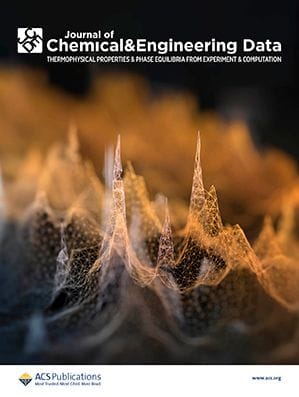Professor J. Ilja Siepmann of the University of Minnesota will serve as the next editor-in-chief of the Journal of Chemical & Engineering Data (JCED) beginning January 1, 2021. He will succeed Professor Joan F. Brennecke of The University of Texas at Austin, who has led the journal since 2010. Since 2015 Professor Siepmann has served […]


Professor J. Ilja Siepmann of the University of Minnesota will serve as the next editor-in-chief of the Journal of Chemical & Engineering Data (JCED) beginning January 1, 2021. He will succeed Professor Joan F. Brennecke of The University of Texas at Austin, who has led the journal since 2010.
Since 2015 Professor Siepmann has served as a JCED associate editor. Since 1994 he has been on the faculty at the University of Minnesota, where he is the Distinguished McKnight University Professor and Distinguished Teaching Professor in the department of chemistry and a member of the graduate faculties in chemical physics, chemical engineering, and materials science. He also serves as director of the Nanoporous Materials Genome Center funded by the U.S. Department of Energy.
I recently interviewed Professor Siepmann to learn more about his goals for the journal, the challenges facing this field of research, advice to upcoming researchers, and what it means to be the next editor-in-chief. Here are the highlights of our conversation.
Learn more about the Journal of Chemical & Engineering Data’s incoming Editor-in-Chief J. Ilja Siepmann in this Q&A.
What are your plans for JCED moving forward?
My vision for the Journal of Chemical & Engineering Data is to make it the preeminent journal covering data on phase behavior and thermophysical properties. JCED will stand out as the most trusted source for accurate, precise, and reproducible phase equilibrium and thermophysical data. JCED’s role is to attract, identify, and celebrate truly outstanding papers. At the same time, JCED will strive to nurture the next generation of talents and, thereby, to elevate the thermophysical data field. To raise the bar, JCED will provide new guidance on expectations to authors and peer reviewers.
What are the major challenges and opportunities facing researchers who publish chemical and engineering thermophysical properties data?
While reproducibility and uncertainty quantification are major challenges for all scientific research, they are pivotal for JCED’s community with its focus on data. The emphasis on well-defined materials and mixtures of known compositions is essential for data reproducibility and also sets JCED apart from other journals emphasizing technological applications where economic considerations might favor materials with defects and formulations with slight variability in composition.
Generating large quantities of thermophysical data (either through experiment or molecular modeling and simulation) is “easy;” however, selecting relevant chemical systems, proficiently carrying out experimental and computational work, and correctly analyzing the data (including controls and meaningful uncertainty estimation) to obtain consequential thermophysical data is of utmost difficulty. Although much harder to measure, data on the absorption, adsorption, and diffusion of multi-component mixtures is often essential for technological applications.
Why should researchers outside the field take an interest in JCED? How does the research published in JCED affect people’s lives?
High-quality phase equilibrium and thermophysical data are essential:
- To select the most promising processes for the separation of chemical mixtures and the capture of desirable or harmful compounds.
- To develop the most promising chemical compounds/formulations for refrigeration, lubrication, and delivery.
- To tune chemical processes and working fluids to improve their performance.
- To test and validate theories and models, providing a molecular-level understanding of chemical systems.
Given the societal need to move away from energy-intensive chemical separation processes, coverage beyond fluid phase behavior will serve the journal well. Similarly, there are significant data needs for the development of alternative refrigerants with desirable thermophysical properties and dramatically reduced global warming potential.
What advice would you give to emerging researchers in this field?
Aim high and be creative! While some incentives favor publishing many papers and selecting “hot” topics also investigated by many other researchers, a researcher’s reputation will be shaped mostly by the rigor and insightfulness of your papers and on whether your work opened new directions for your field of research.
In designing your measurements and writing your manuscripts, you always want to keep value to the reader and community at the forefront of your mind. Comparison with available data in the literature and providing context does not detract from your achievements. Carrying out measurements over a wide range of conditions (e.g., temperature, pressure, and composition) and considering various sources of uncertainties (e.g., sample purity, instrumentation/computational method, and statistical variations) strengthens the conclusions of your paper and, ultimately, increases the impact of your work.
What does being the next JCED editor-in-chief mean to you?
Although I have contributed to the field of thermophysical data for more than 25 years (starting with work on predicting the critical properties of long linear alkanes) and have served as an associate editor for JCED since 2015, I might be considered an outsider bringing a fresh perspective as editor-in-chief because my research efforts rely on molecular modeling and simulation. Experimental measurements of thermophysical data have been pivotal for the inception of thermodynamics and have shaped this field (and also industrial chemistry) for more than 400 years. In contrast, the computation of accurate thermophysical data for specific chemical systems started only 40 years ago. Thus, to some extent, this appointment as the next editor-in-chief is validation for my subfield of chemical research. However, far from a zero-sum game, it will be the combination of experiment and computation that will advance the chemical sciences and accelerate the development of technological applications that benefit society.
